|
Featured picture tools: |
These featured pictures, as scheduled below, appeared as the picture of the day (POTD) on the English Wikipedia's Main Page in July 2009. Individual sections for each day on this page can be linked to with the day number as the anchor name (e.g. [[Wikipedia:Picture of the day/July 2009#1]] for July 1).
You can add an automatically updating POTD template to your user page using {{Pic of the day}} (version with blurb) or {{POTD}} (version without blurb). For instructions on how to make custom POTD layouts, see Wikipedia:Picture of the day.Purge server cache
July 1

|
A lithographed poster for Canadian victory bonds during World War I. Canada's contributions to World War I changed the country's history and enabled it to become more independent, while opening a deep rift between the French and English speaking populations. Battles such as Vimy Ridge, Second Battle of Passchendaele and the Battle of the Somme are still remembered today by anglophones as part of Canada's founding myth, to both its identity and culture. Image credit: Unknown lithographer, from photo by Brown Bros.
Recently featured:
|
July 2
|
Poster for an 1884 American production of William Shakespeare's Othello starring Thomas W. Keene. Because of its varied themes—racism, love, jealousy and betrayal—Othello remains relevant to the present day and is often performed in professional and community theatres alike. The play has also been the basis for numerous operatic, film and literary adaptations. The production history of Othello has seen some landmark milestones: a 1660 performance was probably the first time a professional actress appeared on a public stage in England, and the 1943 production by Margaret Webster ran for 296 performances, almost twice as long as any other Shakespearean play on Broadway. Poster credit: W. J. Morgan & Co.
Recently featured:
|
July 3
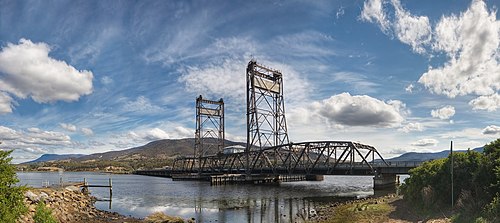
|
|
The Bridgewater Bridge and Causeway is a vertical-lift bridge located in Hobart, Tasmania that crosses the River Derwent. Construction began in 1939 but was delayed due to World War II; the bridge opened in 1946. It is the largest lift bridge in Australia and one of the few left in the Southern Hemisphere. Photo credit: Noodle snacks
Recently featured:
|
July 4

|
John Trumbull's Declaration of Independence, a 12 by 18 feet (3.7 by 5.5 m) oil painting depicting the presentation of a draft of the United States Declaration of Independence to the Second Continental Congress. While this event did take place, it was not actually in the presence of all the people in the picture. The painting can be found in the rotunda of the United States Capitol. Painting credit: John Trumbull
Recently featured:
|
July 5
|
A panorama of Dar es Salaam, the largest city in Tanzania. Although it lost its official status as capital city to Dodoma in 1974, it remains the center of the permanent central government bureaucracy and continues to serve as the capital for the Dar es Salaam Region. Photo credit: Muhammad Mahdi Karim
Recently featured:
|
July 6
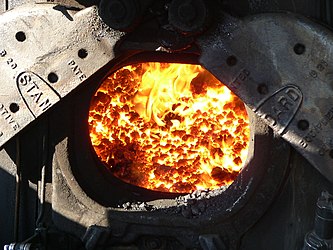
|
The firebox of a coal-fired steam locomotive, where the fuel is burned, producing heat to boil the water in the boiler. Most are somewhat box-shaped, hence the name. This firebox burns at approximately 3,500 °F (1,930 °C). Photo credit: Mark Pellegrini
Recently featured:
|
July 7
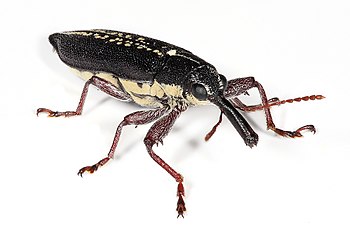
|
Rhinotia hemistictus is a species in the Belidae family of weevils. The belids are known as "primitive weevils" because they have straight antennae, unlike the "true weevils" or Curculionidae which have elbowed antennae. Photo credit: Fir0002
Recently featured:
|
July 8
|
A panoramic view of the 615-megawatt San Gorgonio Pass Wind Farm, the fourth largest wind farm in the United States, located at the western end of the Coachella Valley in California, as viewed from the top of the Palm Springs Aerial Tramway in the San Jacinto Mountains. The Interstate 10 freeway cuts across the image horizontally, and California State Route 62 comes off it to the north. Photo credit: Matt Field
Recently featured:
|
July 9
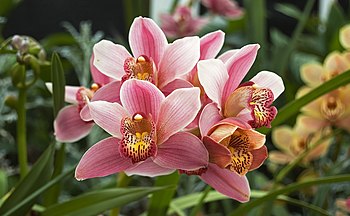
|
A boat orchid hybrid. Boat orchids comprise 52 evergreen species in the orchid family Orchidaceae. The genus name Cymbidium is derived from the Greek word kumbos, meaning 'hole' or 'cavity', which refers to the form of the base of the lip. In the horticultural trade, it is usually abbreviated Cym. Photo credit: User:Flying Freddy
Recently featured:
|
July 10

|
|
A multiple exposure composite image of the implosion of a chimney at the former brewery "Henninger" in Frankfurt am Main, Germany. This controlled demolition technique involves strategically placing explosive material and timing its detonation so that a structure collapses on itself in a matter of seconds, minimizing the physical damage to its immediate surroundings. Photo credit: Heptagon
Recently featured:
|
July 11

|
An animated view of Voyager I's approach to Jupiter. One frame of this image was taken each Jupiter day (approximately 10 hours) between January 6 and February 9, 1979, as the space probe flew from 58 million to 31 million kilometers from Jupiter during that time. The small, round, dark spots appearing in some frames are the shadows cast by the moons passing between Jupiter and the Sun, while the small, white flashes around the planet, are the moons themselves. Image credit: NASA
Recently featured:
|
July 12
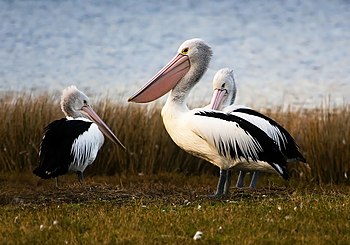
|
Three Australian Pelicans (Pelecanus conspicillatus), a medium-sized pelican species widespread on the inland and coastal waters of Australia and New Guinea, as well as Fiji, parts of Indonesia and rarely New Zealand. The birds are usually 1.6 to 1.8 m (5.3–6 ft) long with a wingspan of 2.3 to 2.5 m (7.6–8.3 ft) and weigh 4 to 13 kg (9–29 lb). Photo credit: Noodle snacks
Recently featured:
|
July 13
|
Reference ranges for blood tests, sorted by mass concentration. A reference range is a set of values used by a health care provider to interpret a set of medical test results. The range is usually defined as the set of values 95 percent of the normal population falls within, or two standard deviations from the mean. All values (with some exceptions) denote blood plasma concentration, which is approximately 60–100% larger than the actual blood concentration if the amount inside red blood cells is negligible. Image credit: Mikael Häggström
Recently featured:
|
July 14
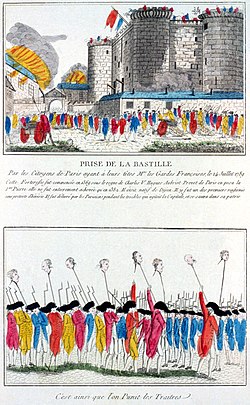
|
A hand-tinted French etching depicting the storming of the Bastille on 14 July 1789. The fall of the Bastille, along with the earlier Tennis Court Oath, is considered the beginning of the French Revolution, which deposed King Louis XVI and instituted the French First Republic. According to the caption, the Paris provost Hugues Aubriot, who laid the first stone in 1369, became one of its first prisoners under the pretext of heresy. The caption under the lower image reads, "This is how we punish traitors." Image credit: Unknown |
July 15
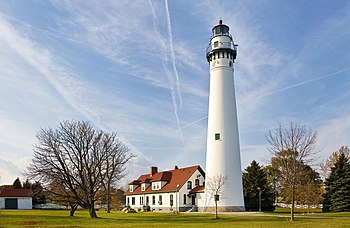
|
Wind Point Light is a lighthouse located at the north end of Racine Harbor in the U.S. state of Wisconsin. The lighthouse stands 108 feet (33 m) tall. Constructed in 1860, it is one of the oldest and tallest active lighthouses on the Great Lakes, and is listed on the National Register of Historic Places. Photo credit: JeremyA
Recently featured:
|
July 16

|
The Saturn V rocket carrying the Apollo 11 mission, the first manned mission to land on the Moon, launches from Kennedy Space Center on July 16, 1969. It was the fifth human spaceflight of Project Apollo, and carried Mission Commander Neil Armstrong, Command Module Pilot Michael Collins and Lunar Module Pilot Buzz Aldrin. On July 20, Armstrong and Aldrin became the first humans to land on the Moon, while Collins orbited above. Photo credit: NASA
Recently featured:
|
July 17
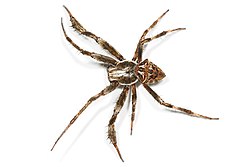
|
Eriophora heroine is a species of orb-weaver spider in the Eriophora genus. Many of the species in this genus, including E. heroine, were formerly members of Araneus. Photo credit: Fir0002
Recently featured:
|
July 18

|
|
The Richmond Bridge in Richmond, Tasmania, Australia, is the oldest bridge still in use in the country, having been completed in 1825. Listed on the Australian National Heritage List, it is constructed of sandstone and was built with penal labour. Photo credit: Noodle snacks
Recently featured:
|
July 19
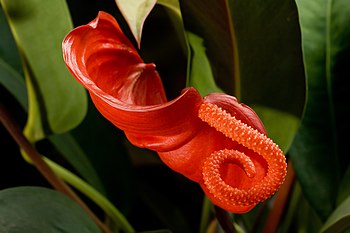
|
An inflorescence, a group or cluster of flowers arranged on a stem that is composed of a main branch or a complicated arrangement of branches, of Anthurium scherzerianum. Strictly speaking, an inflorescence is the part of the shoot of seed plants where flowers are formed and which is accordingly modified. Photo credit: Noodle snacks
Recently featured:
|
July 20

|
The Mazda RX-8 sports car is a front mid-engine, rear-wheel drive four-seat coupé manufactured by Mazda Motor Corporation. It is the successor to the RX-7 and, like its predecessors in the RX range, it is powered by a rotary engine. The RX-8 began North American sales in the 2004 model year. Photo credit: Fir0002
Recently featured:
|
July 21
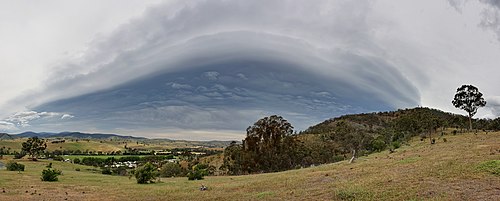
|
|
The underside of a weak shelf cloud, a low, horizontal wedge-shaped arcus cloud. Arcus clouds are associated with the leading edge of thunderstorm outflow, or occasionally with a cold front even in the absence of thunderstorms. Rising cloud motion often can be seen in the leading (outer) part of the shelf cloud, while the underside often appears turbulent and wind-torn. Photo credit: Fir0002
Recently featured:
|
July 22
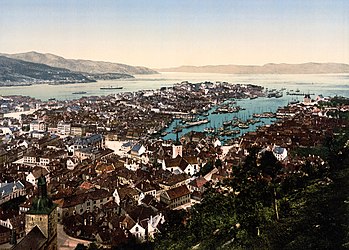
|
A photochrom of Bergen, the second-largest city in Norway, from the 1890s. Visible are the Korskirken in the foreground, the historic harbour Bryggen with its boats and the Bergenhus Fortress in the background. Thought to have been founded by King Olav Kyrre in 1070, Bergen served as Norway's capital from 1217 to 1299. Image credit: Detroit Publishing Co.
Recently featured:
|
July 23

|
Haile Selassie I was Ethiopia's regent from 1916 to 1930 and Emperor of Ethiopia from 1930 to 1974. The heir to a dynasty that traced its origins to the 13th century, and from there by tradition back to King Solomon and the Queen of Sheba, he is a defining figure in both Ethiopian and African history. Selassie is revered as the religious symbol for God incarnate among the Rastafari movement, whose name comes from Ras (literally "Head," an Ethiopian title equivalent to Duke), and Tafari Makonnen, Selassie's pre-coronation name. Photo credit: American Colony, Jerusalem
Recently featured:
|
July 24
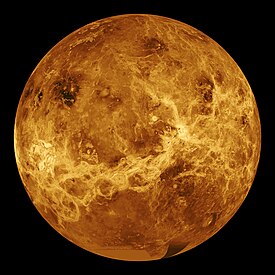
|
A radar image of the surface of Venus, centered at 180 degrees east longitude. This composite image was created from mapping by the Magellan probe, supplemented by data gathered by the Pioneer orbiter, with simulated hues based on color images recorded by Venera 13 and 14. No probe has been able to survive more than a few hours on Venus's surface, which is completely obscured by clouds, because the atmospheric pressure is some 90 times that of the Earth's, and its surface temperature is around 450 °C (842 °F). Image credit: NASA
Recently featured:
|
July 25
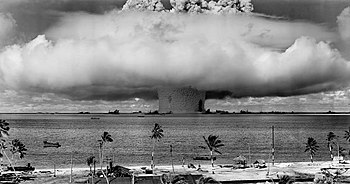
|
The "Baker" explosion, part of Operation Crossroads, a nuclear weapon test by the United States military at Bikini Atoll, Micronesia, on July 25, 1946. Its purpose was to test the effect of nuclear weapons on naval ships. It was the second US nuclear bomb set off since the bombing of Nagasaki. Photo credit: United States Department of Defense
Recently featured:
|
July 26

|
The Monarch (Danaus plexippus) is a milkweed butterfly, perhaps the best known of all North American butterflies, although it can be found in Western Europe as well as Australia and New Zealand. Its wings feature an easily recognizable orange and black pattern, with a wingspan of 8.9 to 10.2 centimetres (3.5 to 4.0 in). Photo credit: Derek Ramsey
Recently featured:
|
July 27
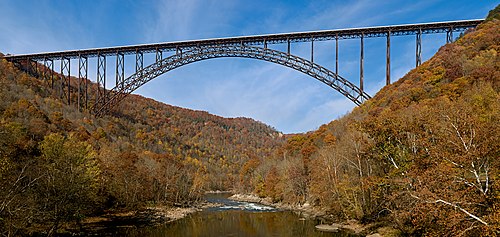
|
|
The New River Gorge Bridge in Fayetteville, West Virginia, United States, is a steel arch bridge that crosses the New River. It opened in 1977 and is the longest and highest steel arch bridge in the Western Hemisphere at 3,030 feet (920 m) long and 876 feet (267 m) high. It is home to the annual Bridge Day, an event in which the bridge is closed to vehicles and participants are allowed to BASE jump to the valley floor below. Photo credit: JaGa
Recently featured:
|
July 28
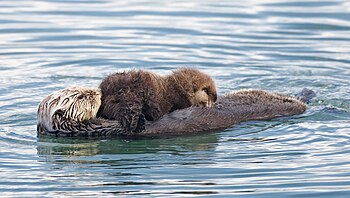
|
A sea otter (Enhydra lutris) nurses her pup from nipples on her abdomen. Native to the coasts of the northern and eastern North Pacific Ocean, sea otters eat primarily invertebrates such as sea urchins and are among the smallest marine mammals. They are vulnerable to oil spills as their primary form of insulation is thick fur. Photo credit: Mike Baird
Recently featured:
|
July 29
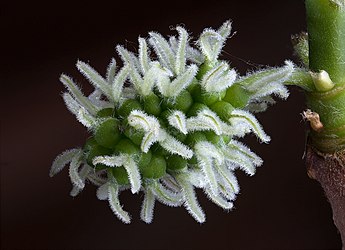
|
Female flowers of a monoecious variety of black mulberry (Morus nigra), a species of mulberry native to southwestern Asia, where it has been cultivated for so long for its edible fruit that its precise natural range is unknown. Photo credit: Noodle snacks
Recently featured:
|
July 30

|
Schematic representation of the two methods with which to assemble an atomic bomb. An A-bomb produces its explosive energy through nuclear fission reactions alone. A mass of fissile material (enriched uranium or plutonium) is assembled into a supercritical mass—the amount of material needed to start an exponentially growing nuclear chain reaction—either by shooting one piece of sub-critical material into another (the "gun" method, shown on top here), or by compressing a sub-critical sphere of material using chemical explosives to many times its original density (the "implosion" method, at bottom). Image credit: Fastfission
Recently featured:
|
July 31

|
The Night Watch is one of the most famous works by the Dutch master Rembrandt. It was completed in 1642, at the peak of the Dutch Golden Age. The painting is renowned for three elements: its colossal size (363 x 437 cm, or 11 ft 10 in x 14 ft 4 in); the effective use of light and shadow; and the perception of motion in what would have been, traditionally, a static military portrait. It depicts a Schutterij (volunteer city guard) company being led by Captain Frans Banning Cocq (centre, with a red sash).
Recently featured:
|
Picture of the day archives and future dates


